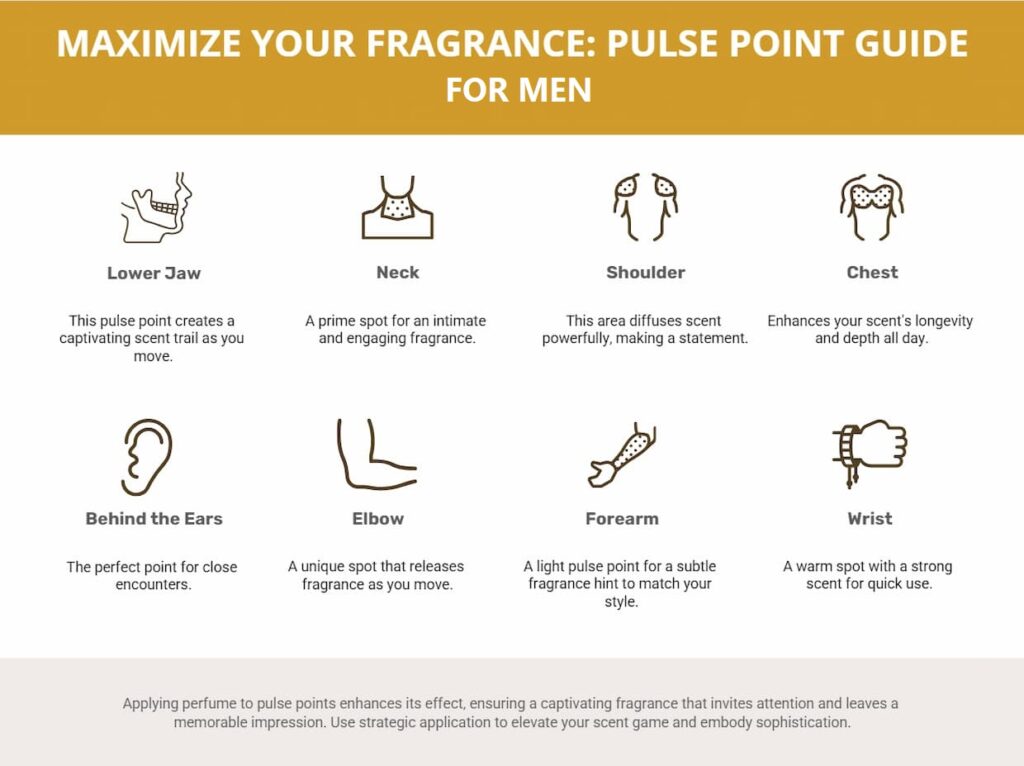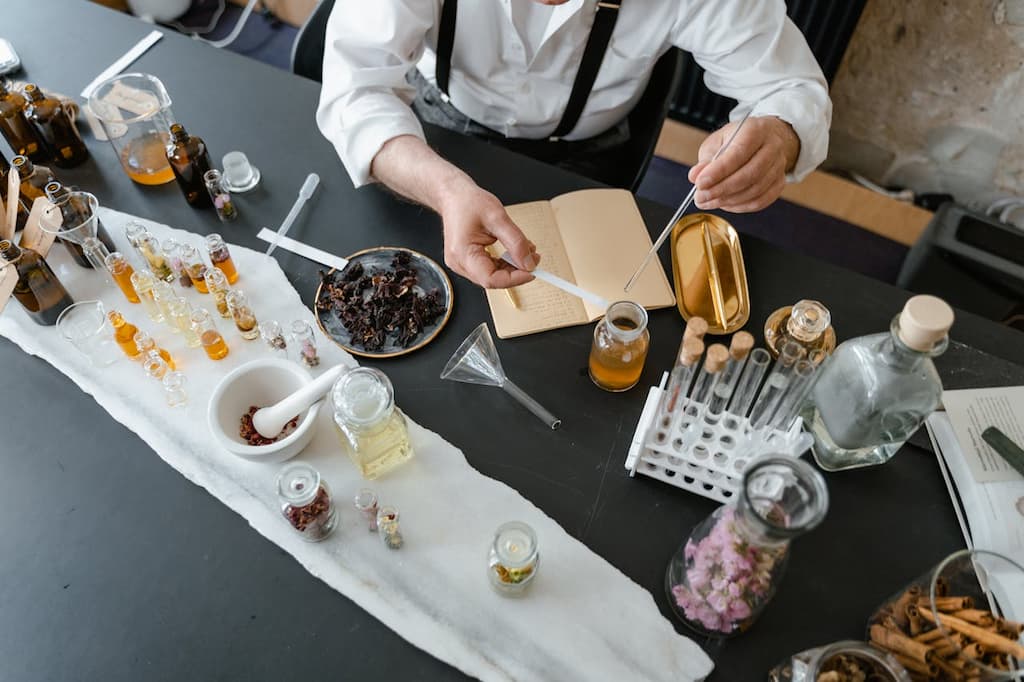Fragrance is a silent introduction—it speaks before you do. Whether you’re gearing up for a date, an important meeting, or simply want to feel good, wearing perfume or cologne correctly is an art. But let’s face it, many of us have been guilty of either overdoing it or not making our scents last long enough.
Most men spray perfumes directly onto their clothes, thinking it will make the scent last longer—but fabric doesn’t allow the fragrance to develop naturally like skin does.
On the other hand, many women apply perfume on men as they do on themselves, focusing on areas like behind the ears or hair, which may not be ideal for a stronger masculine scent projection.
Men’s and women’s pulse points vary slightly, and ignoring this can drastically affect how long and how well your fragrance performs.
This perfume wearing guide for men covers everything from application techniques to common mistakes and medical insights so you can smell fantastic without overwhelming the room. Let’s dive in.
How to Apply Cologne and Perfume Like a Pro

With years of experience, I have put together the best way to apply perfume to ensure a long-lasting and captivating scent throughout the day:
1. Start with Clean Skin
Ensure your skin is free of dirt and sweat before applying perfume. Fragrance clings better to fresh skin, allowing it to develop properly.
Showering beforehand can help remove any lingering scents from soaps or body washes that might interfere with your chosen perfume.
2. Moisturize First
Hydrated skin holds fragrance longer.
Use an unscented lotion or petroleum jelly on pulse points before applying perfume to help lock in the scent. Dry skin absorbs and dissipates fragrance quickly, reducing its longevity.
3. Spray from a Distance
Hold the bottle 3-6 inches away and mist lightly.
Spraying too close can create concentrated wet spots that evaporate quickly rather than spreading evenly.
4. One Spray Per Pulse Point
Less is more. A couple of sprays should suffice.
Over-application can lead to scent fatigue, making you unable to smell your fragrance but overwhelming others around you.
5. Let it Dry Naturally
Never rub your wrists together after spraying.
Friction breaks down fragrance molecules and alters the scent composition, causing the top notes to fade faster than intended.
6. Layer Your Scent
Enhance longevity by using matching scented body washes, lotions, or deodorants from the same fragrance line.
This layering technique helps create a more cohesive and long-lasting scent experience.
7. Hair Application (Optional)
If you want your scent to linger throughout the day, you can lightly mist your hair.
However, avoid direct spraying as alcohol-based perfumes can dry out hair. Instead, spray onto a hairbrush and run it through your strands.
8. Clothing Considerations
While fabric can retain fragrance well, applying perfume to clothes can alter how the scent develops and may stain delicate fabrics.
If you choose this method, mist from a distance.
9. Storage Matters
Keep your perfume in a cool, dark place away from direct sunlight and heat. Exposure to high temperatures can alter the fragrance composition over time.
However, proper storage is essential for maintaining perfume quality. Keep your bottles in a cool, dark place away from direct sunlight and temperature fluctuations to preserve their longevity and scent integrity.
10. The Power of Aging
Older perfume lasts longer and smells richer.
Perfumes, like fine wine, can improve with age. Older perfumes tend to have better longevity and intensity due to maturation of ingredients, oxidation process, settling of the formula.
Many older perfumes contain higher-quality natural ingredients or discontinued formulations that had stronger fixatives, contributing to better performance.
Where to Spray Cologne for Maximum Effect
The Secret? Pulse Points.
Pulse points are areas where your blood vessels are closest to the skin, generating warmth that enhances fragrance diffusion. Appling perfumes to important pulse points can make fragrances last longer.
Perfume Application Pulse Points for Men:

- Lower Jaw – Helps create a balanced scent diffusion closer to your face.
- Neck – Creates an intimate scent aura.
- Behind the Ears – Perfect for close encounters.
- Inside Elbows – Helps your scent last longer.
- Chest – For a subtle projection.
- Shoulders – Great for subtle projection, allowing movement to naturally disperse the fragrance.
- Forearms – Offers a long-lasting scent trail with every gesture.
- Wrists – Classic spot, but don’t rub them together (more on that later!).
For longevity, you should apply perfumes to moisturized skin since dry skin absorbs and diminishes fragrance faster.
The Proper Technique: How to Apply Cologne Without Overdoing It
To apply cologne correctly, target pulse points and areas of your body that generate warmth.
Spray cologne onto these spots from a few inches away to ensure a light mist covers the area. Always apply sparingly, as too much cologne can overwhelm your natural scent and dry your skin.
For best results, use a spray bottle and avoid applying cologne directly on your clothes, as this can alter the natural development of the fragrance.
Why the Mist Technique Works Best for Cologne Application
The mist technique is favored for cologne application because it evenly distributes the fragrance across your skin without saturating any single area.
This method ensures a light, even layer of scent, enhancing your natural aroma without overpowering it.
Common Mistakes to Avoid to Make Perfume Last Longer
🚫 Spraying too Much:
Many people mistakenly believe that more perfume means better longevity. However, over-application can be overpowering and unpleasant for those around you.
Instead, apply in moderation—one or two sprays per pulse point is usually enough.
🚫 Rubbing Wrists Together:
This is one of the most common mistakes, rooted in the myth that rubbing helps “activate” the fragrance.
In reality, friction breaks down the perfume molecules, causing top notes to dissipate faster and altering the intended scent profile. Let your fragrance dry naturally instead.
🚫 Applying to Dry Skin
Dry skin absorbs fragrance more quickly, reducing its longevity.
Many people skip moisturizing before applying perfume, which leads to a shorter scent lifespan.
To prevent this, apply a fragrance-free moisturizer or a bit of petroleum jelly on pulse points before spritzing.
🚫 Spraying Directly on Hair:
While it’s tempting to add scent to your hair for a lingering effect, alcohol-based perfumes can dry out strands, leading to brittleness.
Instead, spray perfume onto a brush and gently run it through your hair for a more subtle and safer fragrance application.
🚫 Applying Perfume Right before Stepping Out:
Fragrance takes time to settle and develop.
Spraying right before leaving the house means the scent is still in its sharp, initial phase.
Apply at least 15 minutes in advance to allow the notes to blend with your skin.
🚫 Storing Perfume in the Bathroom:
Heat and humidity break down fragrance molecules, diminishing their quality.
Always store perfumes in a cool, dry place away from direct sunlight to maintain their integrity and longevity.
🚫 Not considering the occasion:
A strong, musky fragrance might be perfect for a night out but too overwhelming for an office setting.
Choose lighter scents for daytime and heavier ones for evenings to match the environment appropriately.
Understanding Perfume and Cologne: What’s the Difference? And How to Buy the Right One?

The terms “cologne” and “perfume” are often used interchangeably, but there’s a science behind them. The difference lies in concentration:
- Perfume (Parfum): The highest concentration (20-30% fragrance oils) lasts up to 24 hours.
- Eau de Parfum (EDP): Slightly lighter (15-20% oils), lasting about 6-8 hours.
- Eau de Toilette (EDT): Popular for daily wear (5-15% oils), lasting 4-6 hours.
- Eau de Cologne (EDC): Lightest concentration (2-5% oils), usually lasts 2-4 hours.
Choosing the right perfume also depends on how it interacts with your body odor.
Those with naturally strong body odors may benefit from higher concentration perfumes (EDP or Parfum) as they provide better coverage and longevity.
If you have a lighter natural scent, EDT or EDC can offer a refreshing and subtle fragrance without overwhelming your skin chemistry.
Additionally, citrus-based and aquatic fragrances work well for people with oily skin, as these scents balance excess sebum, while woody and spicy perfumes complement drier skin types by providing warmth and depth.
The goal of wearing fragrance is to complement your personality, not overwhelm. When applied correctly, a good scent enhances your confidence and leaves a lasting impression.
Follow these perfume application tips, avoid common mistakes, and you’ll master the art of perfume application in no time.
Smell good, feel good, and go conquer the world—one spritz at a time!
More FAQs About How to Put on Cologne
How Men and Women Apply Fragrance Differently
While the fundamentals of application are the same, men typically go for pulse points like the chest and wrists, while women often spray behind the ears, hair, and even the back of the knees for a subtle scent trail.
Should You Apply Fragrance on Clothes?
There’s a debate on applying perfume to clothing. While fabric can hold scent longer, it alters how the fragrance develops and may stain delicate fabrics. If you choose to spray your clothes, do a patch test first.
How Many Sprays? Applying Cologne Properly
The number of cologne sprays depends on the fragrance concentration, your personal preference, and the occasion. Generally, two to four sprays on pulse points are ideal for everyday use.
Can I Mix Different Perfumes Together?
Yes, you can mix different perfumes together—this is known as fragrance layering—but it requires some knowledge of scent composition. The key is to blend fragrances that complement each other rather than clash.
Can Fragrance Impact Health?
Some people experience allergic reactions or headaches from strong scents. If you’re prone to allergies, opt for hypoallergenic or essential oil-based perfumes. Additionally, dermatologists recommend avoiding fragrance on sensitive skin areas.
Is it Bad to Wear Cologne Every Day?
No, it’s not bad to wear cologne every day, as long as you apply it correctly and choose a fragrance that suits the occasion. Daily use can enhance your confidence and personal style, but over-application or using overpowering scents in enclosed spaces can be overwhelming.
If you have sensitive skin, opt for alcohol-free or hypoallergenic fragrances to prevent irritation. Rotating between different scents can also prevent olfactory fatigue, where you become desensitized to your fragrance over time.



